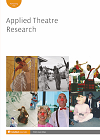
Full text loading...
 , Tomas Motos Teruel1
, Tomas Motos Teruel1
There is a substantial body of evidence on how important it is for adolescents’ wellbeing to engage in meaningful activities such as drama classes. The aim of this study is to assess whether the wellbeing and self-concept of young people who choose to take part in drama activities are significantly different from those adolescents who do not. A group of 198 subjects between the ages of 14 and 20 years participated in the study. The results showed some significant differences in certain wellbeing components – environmental mastery and personal growth – in favour of drama students. One of the most relevant results was the finding of important gender differences in the impact of drama experience on adolescents’ psychological wellbeing and self-concept. Drama girls showed higher levels of self-acceptance, environmental mastery and global wellbeing than non-drama girls. The study also revealed better academic, social and physical self-concepts. These results are discussed in terms of their educational implications in adolescence.

Article metrics loading...

Full text loading...
References


Data & Media loading...

Publication Date:
https://doi.org/10.1386/atr_00082_1 Published content will be available immediately after check-out or when it is released in case of a pre-order. Please make sure to be logged in to see all available purchase options.